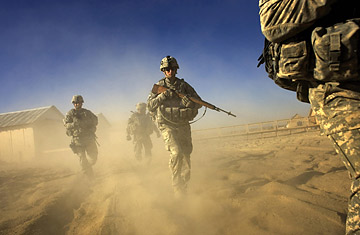
U.S. soldiers on patrol in Paktika province, Afghanistan
(2 of 2)
Seven years and billions of dollars have brought Afghanistan no closer to the peaceful democracy that George W. Bush promised at the beginning of the war. Instead, the country more closely resembles the warlord-led kleptocracy of the 1990s that led to the rise of the Taliban in the first place. Corruption is the defining characteristic of the central government, and President Hamid Karzai is largely seen as an American puppet unable to rein in the excesses of government ministers or even his own family. And he's not even a good puppet — Karzai routinely and publicly berates his foreign guests in a naked attempt to court popularity in advance of presidential elections scheduled for later this year. In doing so, he is not only encouraging anti–foreign sentiment when it is least helpful, but also undermining his own status by proving that he is powerless to do anything.
At least the Obama administration is not going in blind. Last week Secretary of State nominee Hillary Clinton called Afghanistan a "narco state" whose government was "plagued by limited capacity and widespread corruption." And former ambassador to the U.N. Richard Holbrooke, who will serve as Obama's envoy for Southwest Asia, said last year that the Afghan government "is weak; it is corrupt; it has a very thin leadership veneer." And it's not just the Americans. On Sunday NATO Secretary-General Jaap de Hoop Scheffer wrote in the Washington Post that "the basic problem in Afghanistan is not too much Taliban; it's too little good governance. Afghans need a government that deserves their loyalty and trust; when they have it, the oxygen will be sucked away from the insurgency."
There has been development, of course. But even success stories are full of problems. The U.S. has built new schools, but there are not enough teachers, and salaries are so low that nobody stays. On a trip to Helmand last summer I met a farmer who had been offered a water pump that would have enabled him to turn his desert-like property into a field of wheat and vegetables. He declined it, fearing that the Taliban would find out he had accepted a gift from foreigners and would execute him as a spy. (See pictures from Prince Harry's deployment to Helmand.)
Afghans do not see that foreign troops are bringing them the safety they desire. Instead they associate foreigners with air strikes on innocents and raids on houses, while basic security, justice and protection from crime remain out of reach. As one 13-year-old girl who had been kidnapped and raped on her way home from school told me, "Yes, I used to like school, but this happened to me when I walked home one day. Life has not improved since the Taliban left. Either way I can't get an education, but at least under the Taliban I wouldn't have to worry about getting raped."
When farmers are afraid of water pumps and young girls are nostalgic for Taliban rule, it is clear that there has been a strategic failure. Success in Afghanistan will not be measured by the number of Taliban killed or the capture of Osama bin Laden. Even elections mean little when most Afghans assume that they are fixed by foreign nations from the outset. No, success will come as incrementally as the number of teenagers who graduate from school and find a job. It will come when Afghans look to their police for help, and when they can get justice from the courts without a bribe. This is the kind of strategic vision Obama's team needs. This is the change Afghans can believe in.
— With reporting by Ali Safi/Kabul
